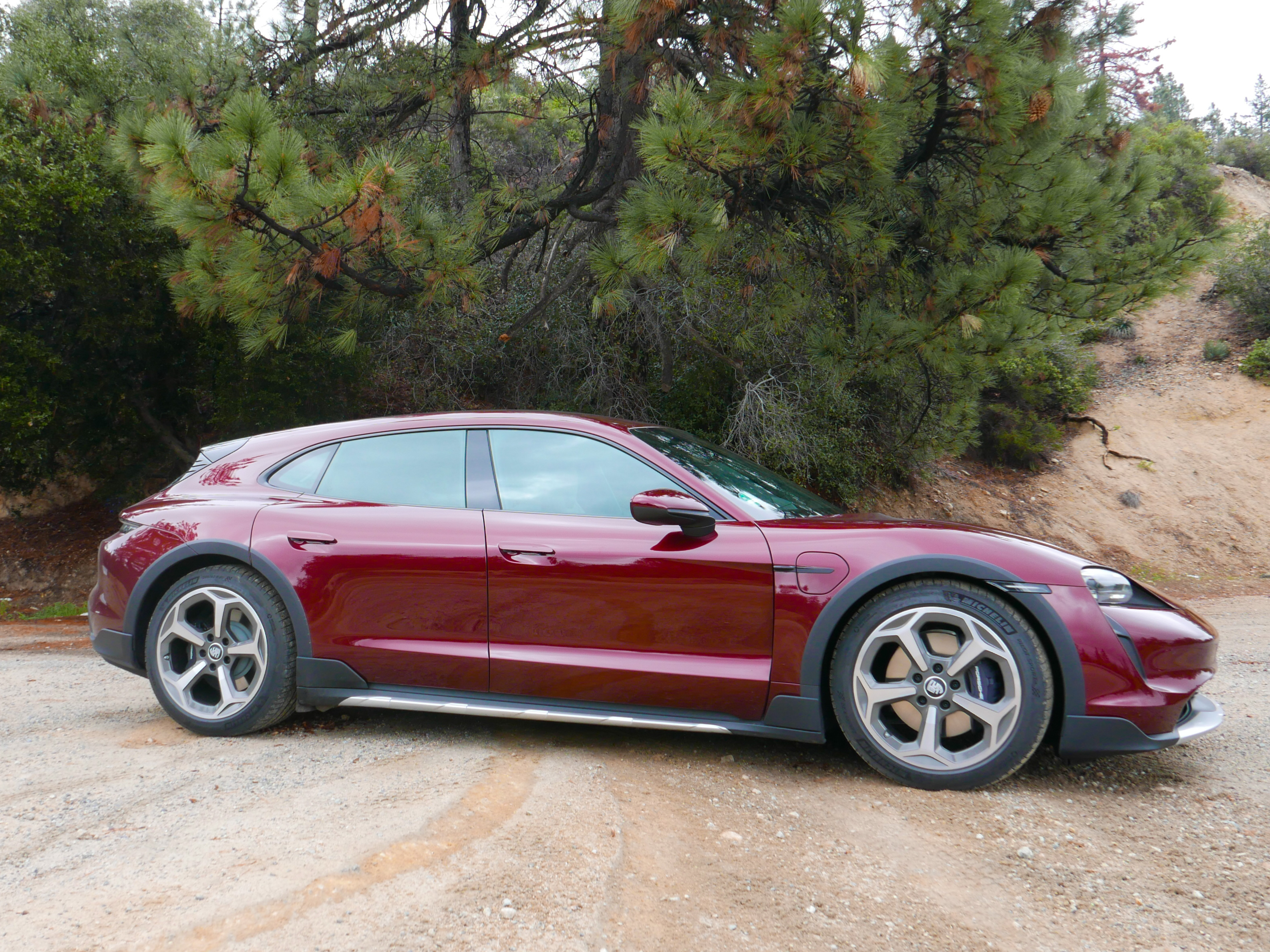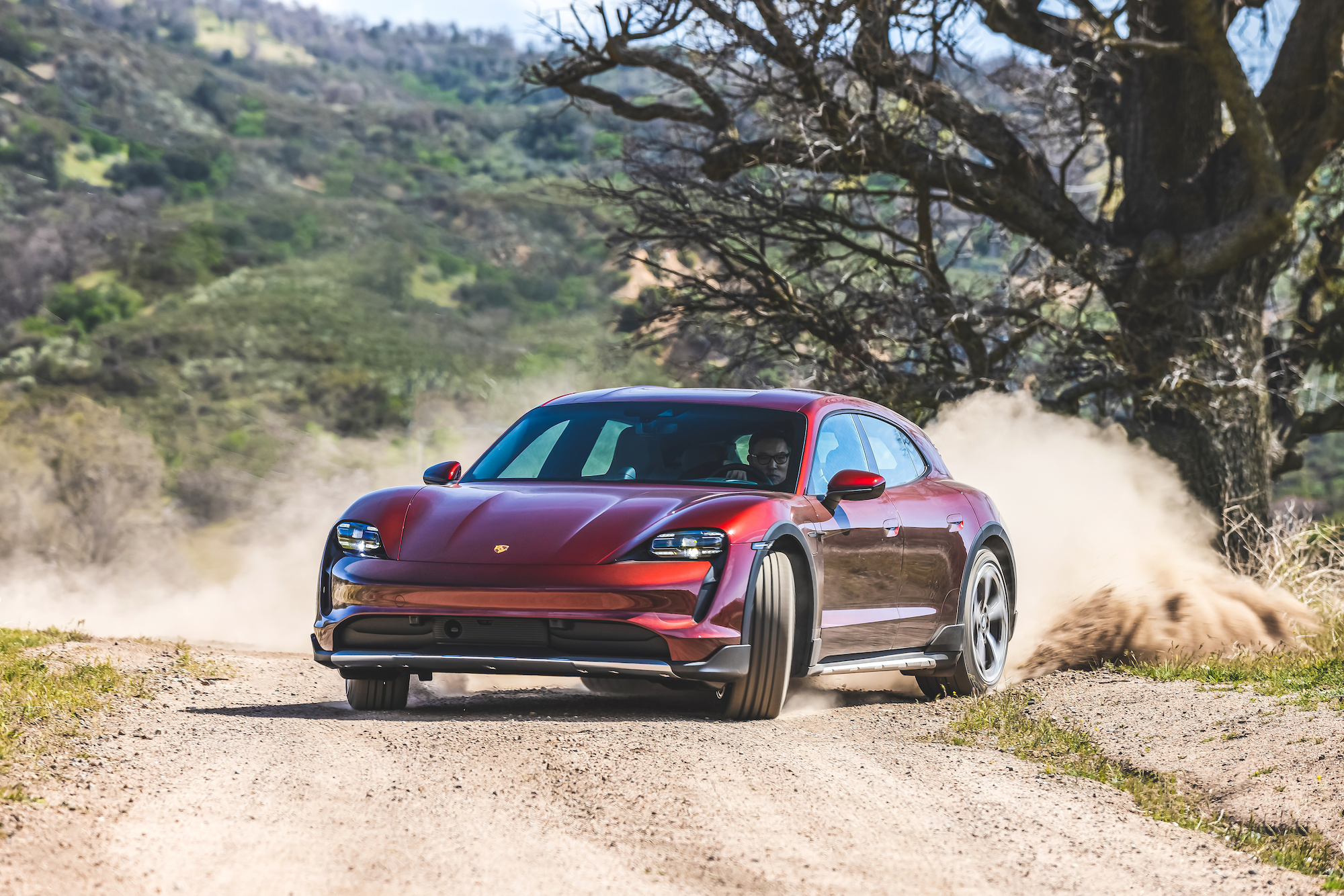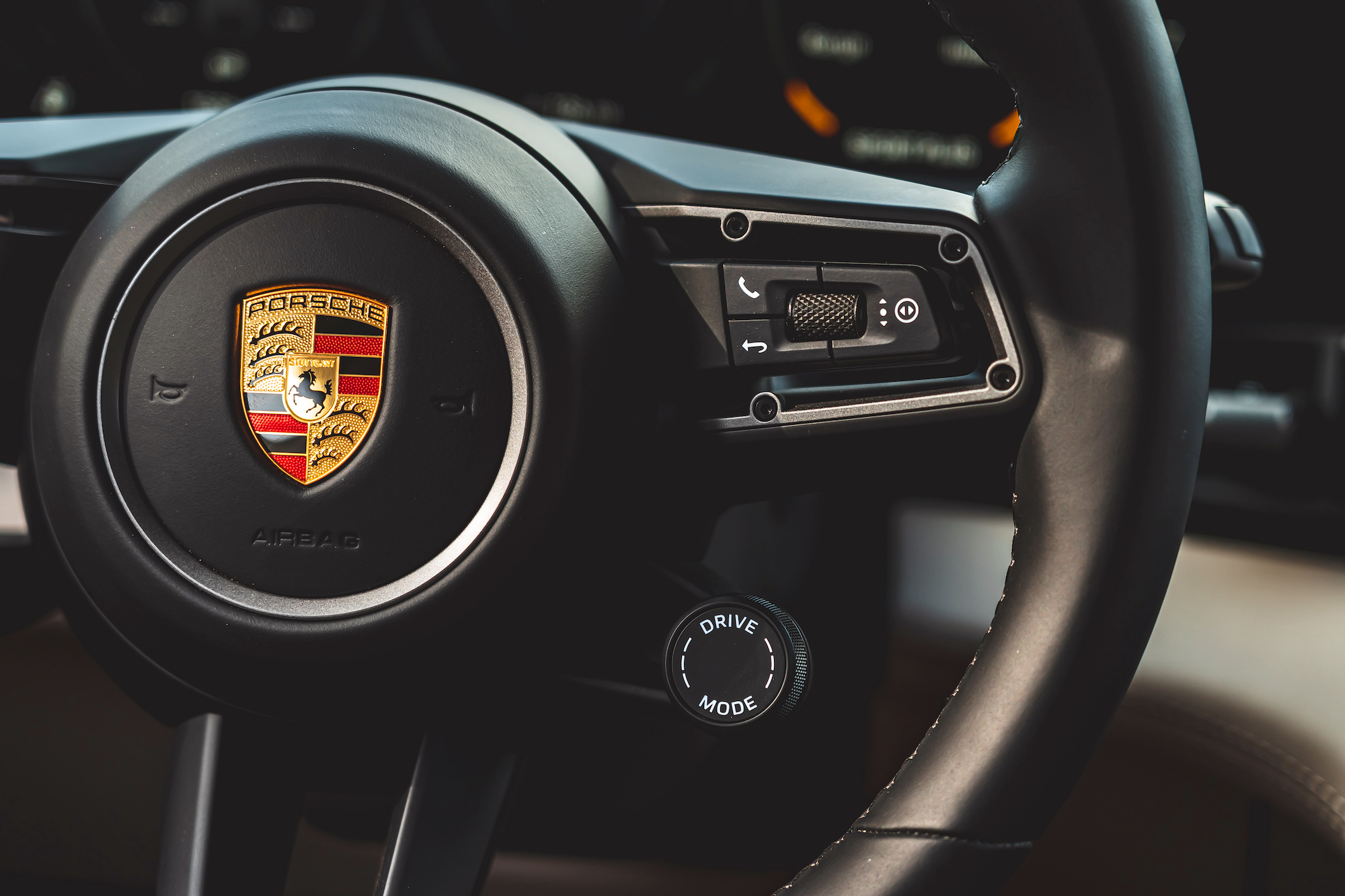Porsche has always gone its own way when it comes to creating new vehicles. It is, after all, the company that continues to stick to the wacky idea that putting the weight of an engine in the rear of a sports car is a great idea. (It is!)
So, bucking the crossover trend to create an all-electric, soft-roading wagon with just 20 more millimeters of clearance than their popular electric Taycan sedan isn’t out of character for the brand. Instead, it’s another example of how Porsche approaches electrification.”You don’t make an electric car. You make a Porsche with an electric powertrain,” Calvin Kim, product spokesperson for the Taycan line, said in a recent interview.
The 2021 Taycan Cross Turismo fits that bill. Powerful, quick, comfortable, luxurious and tech-laden, the Porsche Taycan 4 Cross Turismo (one of four variants of the wagon) offers a blend of practicality with a whole lot of power and speed for under $100,000.
Why Build an Electric Porsche Wagon?
Porsche upended the sports car enthusiast club when it launched the Cayenne nearly 20 years ago and is doing the same with the Taycan and the Taycan Cross Turismo. While the SUV and crossover business is still a tremendous cash cow for the company, nearly 4,500 Taycans were sold in 2020, according to a recent release from Porsche. That’s more than either the 718 or the Panamera line. Porsche also says that from cradle to manufacturing, the new Cross Turismo is carbon neutral — the first vehicle they’ve made that has achieved that status.
“Porsche wanted to create the most sporty capability we can make,” Kim said, “and a wagon version of the Taycan embodies that ethos.”
The 2021 Porsche Taycan Cross Turismo is on sale today. Porsche says that it expects deliveries to start this summer.
Image Credits: Abigail Bassett
Taycan vs. Taycan Cross Turismo
Beyond the obvious form factor, prospective buyers or EV enthusiasts might wonder why someone might opt for a Cross Turismo over the original Taycan?
There are a few important differences between the two vehicles that might push some customers over to the wagon. First up, the Cross Turismo offers more passenger and cargo space. Passengers get an additional 0.35 inches of headroom up front and 3.69 inches in the back. The wagon is also equipped with more cargo space — 15.7 cubic feet behind the rear seats or 42.8 cubic feet with them folded forward. Like the Taycan, the Cross Turismo has an additional 2.9 cubic feet of area in the frunk.
The Cross Turismo also has a skosh 20 millimeters (just short of 1 inch) more ground clearance than the Taycan sedan and an additional driving mode called Gravel. Gravel mode is activated by a soft key on the center console rather than by the mode wheel on the steering wheel. It raises the car’s height and makes changes to the stability control and torque management system for better grip on gravel, snow or ice. Unfortunately, on our short test drive, we didn’t get a chance to put Gravel mode to the test.
Image Credits: Porsche
On top of these features, the Taycan Cross Turismo comes with all-wheel drive and standard air suspension (called Porsche Active Suspension Management or PASM), which, on the Taycan, is a $2,200 option. The Taycan Cross Turismo comes standard with the larger 93.4 kWh battery pack, which is a $5,780 option on the base Taycan sedan. The Cross Turismo is built on the same platform as the Taycan sedan, known as J1, internally.
There are four different variants of the Taycan Cross Turismo, including the one I drove. You can choose from the entry-level Taycan 4 Cross Turismo, the Taycan 4S Cross Turismo, the Taycan Turbo Cross Turismo, and the Taycan Turbo S Cross Turismo. At the highest trims, base prices start at $188,000. Pricing for the Taycan 4 Cross Turismo that I drove starts at $92,250 (including delivery).
Each flavor of Cross Turismo comes with an optional off-road package that adds lower body cladding to prevent rock chips on gravel roads and raises the vehicle by 10 millimeters. Porsche doesn’t state the ground clearance for the Taycan or the Taycan Cross Turismo, but approach and departure angles increase from 12.1 and 15.2 degrees to 12.2 and 16.2 degrees in the electric wagon. In true Porsche fashion, the company says that there are more than 21,000 option combinations based solely on which Cross Turismo you choose, wheel choice, exterior color, and interior selection, not to mention details like badge deletion, stitching, technology options, and seat types.
Charging speeds are the same between the Cross Turismo and the Taycan. Porsche says that on DC fast chargers, the Taycan Cross Turismo can recharge from 5% to 80% in just 22.5-minutes.
Automakers, suppliers and startups see growing market for in-vehicle AR/VR applications
First drive
The Taycan Cross Turismo 4, which I drove, represents the entry point to the new all-electric wagon. While neither Porsche nor the EPA has released range estimates, the European-spec, ruby red machine had just over 250 miles of range at 99% charge when I hopped into it for a Monday afternoon jaunt from Glendale, California to Big Bear and back. That nearly 200-mile trip left me with 68 miles of range in the proverbial tank. While it may seem like that math is off, it’s not, thanks to regenerative braking that helps generate electricity and push some of it back into the battery.
The drive consisted of about 140 miles along the highway and some 60 miles on mountain roads. Thanks to the dual-motor, all-wheel-drive setup that comes standard on all Cross Turismos, the electric wagon felt planted and secure on misty and slightly icy mountain roads and took corners without a modicum of body roll. With a 375 horsepower (469 with launch control) and maximum available 368 lb-ft of torque, passing a sluggish motorist (or three at once) was handled with ease.
The Cross Turismo gets five different driving modes: Range, Normal, Sport, Sport Plus, and Individual. On the highway, I started in Normal mode and noticed how easy it was to push the vehicle beyond the stated speed limit. Using the toggle on the wheel, I switched to Range mode, which helps conserve battery by limiting speed to just 80 miles per hour. All of the modes except Range allow the driver to take the Cross Turismo to its full 136-mile-per-hour potential.
Image Credits: Porsche
My test vehicle was a European model. This meant that certain tech features that come with the Cross Turismo, including Porsche’s advanced driving assistance system InnoDrive and the navigation features, couldn’t be activated since my test drive was in the United States. However, the regular adaptive cruise control did work and I used it extensively on the highway run from Glendale to the base of the mountain.
The Taycan Cross Turismo’s adaptive cruise handled the numerous drivers who cut into my lane. The feature handled these tricky moments the same way I would have, only with a bit more finesse. When a car swerved unexpectedly into my lane, the Cross Turismo slowed without slamming the brakes or stuttering and simply drew the 5,029-pound vehicle down to a slower speed and a comfortable following distance that was neither too short nor too long. As traffic sped up, the system would maintain the following distance without jostling or awkward pauses.
When I reached the base of the mountain, I had around 200 miles of range left. I toggled the Cross Turismo into Sport Plus mode and began the climb. In Sport and Sport Plus, the “engine noise” (for lack of a better term) inside the cabin becomes more audible. Porsche says that to create the sound, they recorded the motors’ audio, adjusted it and then piped the sound into the cabin. Outside the cabin in both modes, the vehicle becomes a bit louder but not nearly as raucous as a combustion Porsche.
The roads leading to Big Bear are more winter worn than those in the Los Angeles Basin and have plenty of cracks and potholes after a wet season. On the day I drove the route, it was misty and around 40 degrees, with frost licking the tips of the pines at higher elevations giving them a silver hue. The road was wet and wound through dense patches of cloud and fog, causing a few small icy spots on the roadway. The Cross Turismo took all of those challenges in stride.
If you’ve ever hustled a heavy and relatively large vehicle up a technical and twisting road, you know the body roll battle all too well. It’s a non-issue in the Cross Turismo. Because the body weight (battery and motors) are set low into the floor, the Cross Turismo feels as planted, comfortable and capable as a 911. The steering is direct and communicative without being twitchy. On the climb, I managed to trim off roughly 10 minutes on my estimated arrival without breaking a sweat or really pushing the car anywhere near the limit. At the predetermined coffee stop, I’d worn the battery down to 118 miles–plenty to get me back to Glendale with room to spare.
I ran the mountain road in Sport and cruised back to the valley. At the bottom of the mountain road, I noted that the vehicle had gained a few miles back thanks to regenerative braking and had 124 miles remaining. Throwing range anxiety to the wind and vowing to keep my eyes up for potential speed traps, I kept the Taycan Cross Turismo in Sport mode and zipped my way through 3 pm traffic, arriving back at the studio with plenty of power to spare.
Must See
-




Entertainment
/ 8 months agoFaveSzn’s Revelation: Dating Choirmaster at 10 and Sexual Curiosity
Nigerian singer, Chidozie Ugochinyere, popularly known as FaveSzn, has revealed that she once dated...
By Flying Eze -






Europe
/ 8 months agoWhy Hungarian Prime Minister Orban visited
Two months later, the leaders of China and Hungary met again. Hungarian Prime Minister...
By Flying Eze -






News
/ 8 months agoThree dead and millions without power as Tropical Storm Beryl hits Texas
Man, 53, and woman, 74, killed by fallen trees and third person drowns amid...
By Flying Eze






